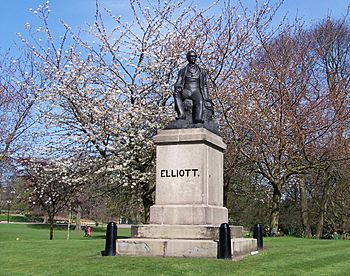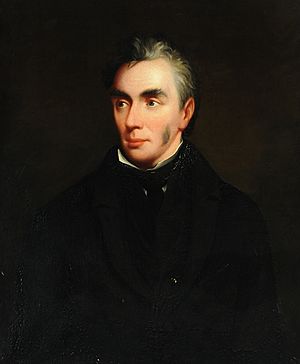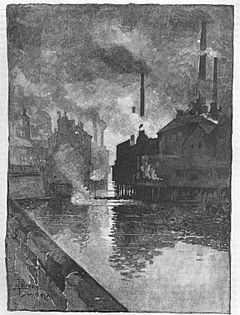Ebenezer Elliott facts for kids
Ebenezer Elliott (born March 17, 1781 – died December 1, 1849) was an English poet. He was known as the Corn Law Rhymer. This nickname came from his strong fight against the Corn Laws. These laws made food very expensive and caused great hardship for poor people. Even though he owned a factory, he cared deeply about working-class people. His dedication made him famous, even long after his poems were no longer widely read.
Contents
Early Life and Learning
Elliott was born in Masbrough, a village near Rotherham, Yorkshire. His father was a strong and passionate man. He was involved in the iron business. Ebenezer's mother was often sick. He was one of eight children who grew up, but he had a lonely childhood.
When he was six, he got smallpox. This illness left him very sick and blind for six weeks. It also affected his health for the rest of his life. He often felt unwell and sad later on.
School Days and Self-Education
Ebenezer first went to a small local school. Then he attended Hollis School in Rotherham. He learned to write a little, but he was not considered a good student. He disliked school and often skipped classes. Instead, he explored the countryside around Rotherham. He loved watching plants and local animals.
At 14, he started reading many books on his own. In his free time, he studied botany, which is the study of plants. He collected flowers and was fascinated by nature. He even wrote about a beautiful green snake he often saw. When he was 16, he began working at his father's iron foundry. For seven years, he only received a small amount of pocket money.
Early Poems and Inspiration
Ebenezer Elliott taught himself to write poetry. He said that long walks in the countryside helped him. He also read many books that his father owned. These books included works by famous poets like John Milton.
Finding His Poetic Voice
One Sunday, Ebenezer visited his aunt. He saw colorful pictures of flowers in a book called English Botany. His aunt encouraged him to draw flowers, and he found he was good at it. His younger brother, Giles, read him a poem about flowers from "The Seasons" by James Thomson. This moment changed everything for Elliott. He realized he could combine his love for nature and his drawing talent by writing poems about flowers.
In 1798, at 17, he wrote his first poem, "Vernal Walk." He was also inspired by other poets like Lord Byron. In 1808, he wrote to Robert Southey, a famous poet, asking for advice. Southey's kind reply started a long friendship through letters. Elliott said Southey taught him how to write poetry.
Challenges and Business Ventures
Elliott's early poems about romantic themes were not always popular. Some critics found them too dramatic. In 1806, he married Frances Gartside, and they had 13 children. He invested his wife's money in his father's iron foundry. However, the family business was in trouble. Elliott lost everything and went bankrupt in 1816.
In 1819, he got money from his wife's sisters. He started a new business selling iron in Sheffield. This business did very well. By 1829, he was a successful iron merchant and steel maker.
Fighting for Change
After losing his business and facing hardship, Elliott deeply understood the struggles of the poor. He believed that the Corn Laws were to blame for his family's financial problems. These laws made him determined to fight for their repeal.
Leading the Fight Against the Corn Laws
Elliott became well known in Sheffield for his strong opinions. He wanted to improve conditions for both factory owners and workers. He started the first group in England to demand changes to the Corn Laws. This was the Sheffield Mechanics' Anti-Bread Tax Society, founded in 1830. He also helped create the Sheffield Anti-Corn Law Society.
He was very active in the Sheffield Political Union. He worked hard to support the 1832 Reform Act, which changed voting rules. Later, he joined the Chartist movement, which pushed for more rights for working people. However, he left the Chartists when they suggested using violence.
The Corn Law Rhymer
Elliott's strong political beliefs showed in his poems. This earned him the nickname "the Corn Law Rhymer." His poems made him famous around the world. In 1831, he published Corn Law Rhymes. These poems were simple, powerful, and full of vivid descriptions. They spoke out against landowners in the government who kept food prices high. They also highlighted the terrible lives of working people.
He published more of his works in a three-volume set. His Corn Law Rhymes were meant to be sung. They carried a message to working-class people. Some poems even suggested tunes like the Marseillaise. In 1835, he published Corn Law Hymns, which were even more direct.
His poems were published in the United States and Europe. A French journalist visited him in Sheffield. People thought the Corn Law Rhymes were written by an uneducated worker. They called Elliott "the Yorkshire Burns." The journalist was surprised to find Elliott a gentle man.
The People's Anthem
One of Elliott's last poems was "The People's Anthem." It appeared in 1848. It was written to be sung and was very popular.
-
-
- When wilt thou save the people?
- Oh, God of mercy! when?
- Not kings and lords, but nations!
- Not thrones and crowns, but men!
- Flowers of thy heart, oh, God, are they!
- Let them not pass, like weeds, away!
- Their heritage a sunless day!
- God! save the people!
-
The end of the poem sounds like the British national anthem, God Save the Queen. It asks for support for ordinary people instead. Many churches did not use hymn books with this poem because it could be seen as a criticism of God. Elliott believed all responsible householders should have the right to vote. The poem remained a favorite for many years.
The words of "The People's Anthem" later appeared in an American hymn-book. It was even used in the rock musical Godspell in 1971, with new music.
Friends and Fellow Writers
Elliott had close friendships with other writers who shared his views. These included James Montgomery and John Holland. They also supported other causes to help people. He was very kind to new poets from working-class backgrounds. He often praised their early writings.
Connections in Sheffield
When he moved to Sheffield in 1833, he became friends with Paul Rodgers. Rodgers was a former shoemaker who became secretary of the Sheffield Mechanics' Institution. Rodgers later led the effort to raise money for a statue of Elliott. He also wrote about Elliott's life after his death. Rodgers shared how Elliott helped the writer Charles Reece Pemberton when he became ill. Elliott even wrote a poem called "Poor Charles" after Pemberton died.
Elliott's poem "Song" celebrates the passing of the 1832 Reform Act. It mentions several poets and political activists. These included Thomas Asline Ward, a leader of the Sheffield Political Union. Another friend was George Calvert Holland, a surgeon from a working-class background who educated himself. Elliott dedicated an early poem to him.
Elliott also exchanged poems with Thomas Lister from Barnsley. Elliott wrote two poems to Lister, encouraging him to write great poetry. Lister also wrote a sonnet to Elliott while on a walking tour in Scotland.
Later Years and Passing
In 1837, Elliott's business faced problems due to a trade slowdown. But he still had enough money to retire in 1841. He moved to land he had bought in Great Houghton, near Barnsley. He lived there quietly. He saw the Corn Laws finally repealed in 1846. He passed away in 1849, at 68 years old. He was buried in the churchyard of All Saints Church, Darfield.
Earlier in his life, Elliott wrote "A Poet's Epitaph." In it, he described how he wanted to be remembered:
-
- Stop, Mortal! Here thy brother lies,
- The Poet of the Poor
- His books were rivers, woods and skies,
- The meadow and the moor,
- His teachers were the torn hearts’ wail,
- The tyrant, and the slave,
- The street, the factory, the jail,
- The palace – and the grave!
News of his death brought many poetic tributes. The American poet John Greenleaf Whittier wrote a powerful poem called "Elliott." He said that working people should carry Elliott to his grave.

-
- Then let the poor man's horny hands
- Bear up the mighty dead,
- And labor's swart and stalwart bands
- Behind as mourners tread.
- Leave cant and craft their baptized bounds,
- Leave rank its minster floor;
- Give England's green and daisied grounds
- The poet of the poor!
In 1854, a statue of Elliott was planned. Walter Savage Landor wrote a poem celebrating this. Once the bronze statue was in place in Sheffield, a blade-maker named Joseph Senior wrote a poem about it. He praised Elliott for feeding "more hungry Britons" with his songs.
Before his death, William Howitt wrote a long article about Elliott in 1846. Howitt visited Elliott and praised his nature poems more than his political works. After Elliott died, his obituary appeared in a magazine. Two books about his life were also published that year.
Legacy and Recognition
Paul Rodgers, Elliott's friend, felt that published portraits of the poet did not look much like him. Two paintings are thought to be by John Birch. One shows him seated with a scroll. The other shows him on a boulder, holding a book. This spot was a favorite of Elliott's. A drawing of Elliott by Margaret Gillies is now in the National Portrait Gallery, London.
The Sheffield Statue
The statue of Elliott by Neville Burnard also was not thought to be a good likeness. In 1854, a Sheffield newspaper reported that many people were disappointed. They felt the sculptor did not capture Elliott's true appearance. However, the newspaper suggested it was meant to be an "idealised" image. In 1875, the statue was moved from the city center to Weston Park, where it still stands today.
The poet John Betjeman mentioned the statue in his poem "An Edwardian Sunday, Broomhill, Sheffield." He wrote that "Your own Ebenezer, Looks down from his height/ On back street and alley." However, Elliott's last home in Sheffield was in Upperthorpe, not Broomhill. A blue plaque marks his former home today. The statue's base simply says "Elliott," without his first name.
Honors in Rotherham
Rotherham, Elliott's birthplace, took longer to honor him. In 2009, a sculpture by Martin Heron was put up on what is now called Rhymer's Roundabout. It is called "Harvest" and shows stylized ears of corn. This refers to his "Corn Law Rhymes." That same year, a new pub in Rotherham was named 'The Corn Law Rhymer'. In 2013, a blue plaque was placed on the town's medical center. This marks the site of the iron foundry where Elliott was born.
 | John T. Biggers |
 | Thomas Blackshear |
 | Mark Bradford |
 | Beverly Buchanan |



